And now for some rural Tunisia
Yesterday I promised you some further insights into Tunisia by showing you a bit of the countryside outside of the capital city Tunis and briefly introducing you to the people. And I'll tell you about their food! This was one of my favourite projects of my career, since I got the chance, as an infrastructure engineer, to figure out how and why a whole programme had worked and how Africa could learn from the experience. And did I mention food?
Caveat emptor on the photographs
The meagre showing of photographs in this post is all I have left after preparing a draft report for the African Development Bank on best practices in African infrastructure development which never got published, mainly due to changes at executive level at the Bank and restructuring which ended up affecting our direct client. Since it wasn't published, and I took the photographs, there shouldn't be an attribution issue with these images. In any case, I only had a few left, as after a day of searching my files, I have to conclude I must have left the originals at my old company. That's a way of apologising in advance for the quality of some of these images!
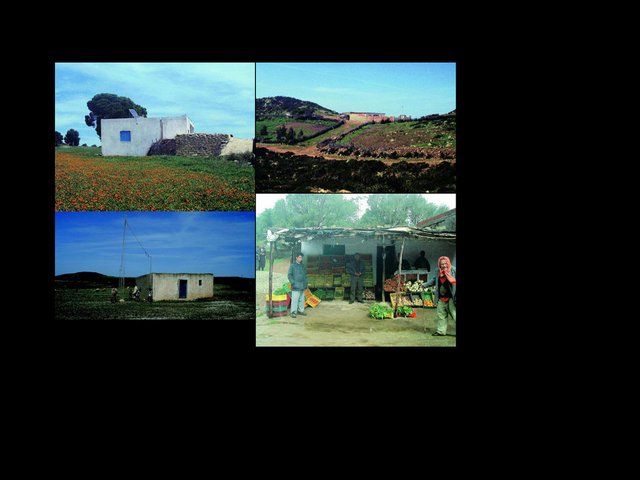
This collage gives you an idea of what the countryside in northern Tunisia looks like in spring. There were wildflowers everywhere we looked, lots of olive groves and vegetable farming.
A bit about Tunisia
Tunisia is the smallest country in North Africa in terms of area. The geography of the country is a combination of coastal lowlands, ranging south through fertile rolling hills and mountainous areas, to the northern Sahara in the far south of the country. It's dry and mountainous in the western interior as well. Rural households in Tunisia are scattered in loose, isolated agglomerations. A typical rural household may also incorporate several related families. The map below gives you a sense of the geography of the country. There are some big lakes in Tunisia.
Today's post will mention the two big bodies of water at the northern tip of the country, in the area known as Bizerte.
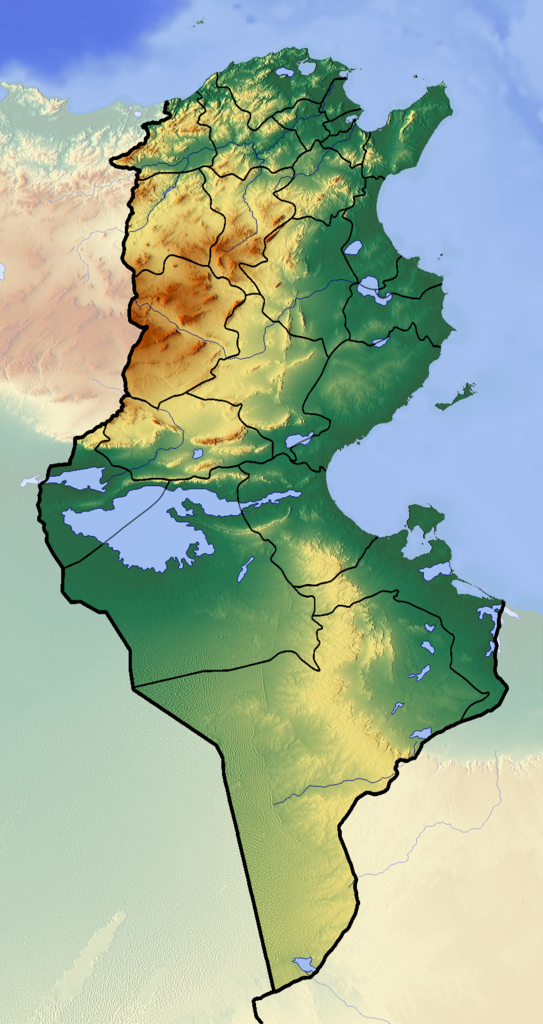
First President's Vision
The first president of the republic, Habib Bourguiba, had a vision to improve the economic and social conditions of the people through a quantum leap in education, health care and integrated rural development. One of his quotes that really struck me was
which I've translated as
He had a particularly strong interest in women's rights and implemented many reforms in the early years of his presidency, including the abolishment of polygamy, the introduction of the right to divorce, and establishing women's right to vote. Bourguiba also had a deep-seated conviction in the power of education to transform the country. Prior to independence most Tunisian women were illiterate, so the education programme under the first republic emphasised education for girls.
Fast Facts about Tunisia
Here are some "fast facts" to show you how the country advanced over just a few decades.
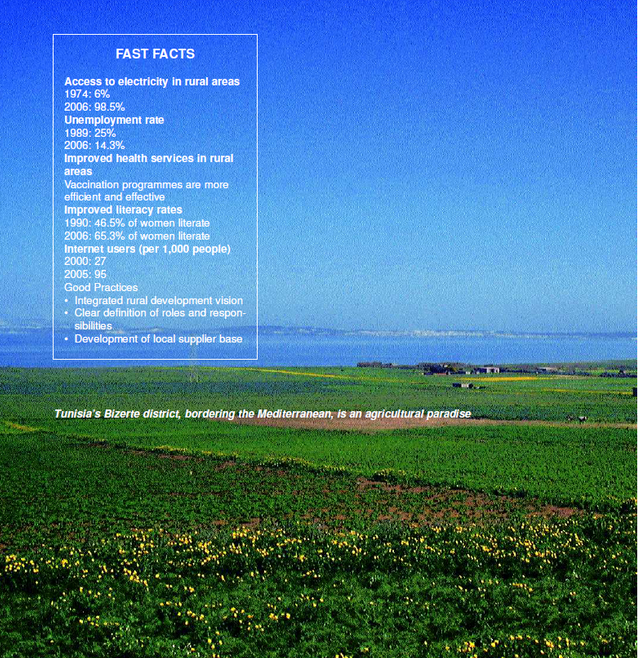
I used that photo because, although it's one that didn't survive my move from my old company and I had to take a picture of a hard copy, it gives you some idea of the lushness of the landscape in spring, and why my jaw dropped at each new view around every new bend.
I was there to look at their rural electrification programme
Specifically, I was there to understand why it had been such a wild success, given that at the time (~2007) still more than two thirds of Africans did not have access to electricity. What made Tunisia different?
Some technical background and context - hang in there
Tunisia's rural electrification programme has its roots in the integrated rural development vision of the country. I was deeply impressed at the time at the way that the government managed to make top-down planning by the national government in collaboration with the utility STEG (la Société Tunisienne de l'Electricité et du Gaz, or Tunisian Electricity and Gas Company) meet bottom-up consultation at village level work. It was like an iterative knitting process - plan at national level, inform through local government structures, get feedback from local population, use feedback to adapt national level programme - over many years, and it worked.
How do we know it worked? Did you see their access to electricity by 2006 compared to 1974 in that Fast Facts picture? Wow! That means almost the whole country went from not having any access to electricity to nearly the whole country, even deep rural areas, having the opportunity to plug in a kettle and watch TV.
Yup, a bit more technical stuff - it'll be over soon
The rural electrification programme was conceived as part of the vision to improve the living standards of Tunisia's rural population in line with the pillars of rural development. The integrated nature of this vision strongly informed its translation into goals and action plans. These were:
- Education
- development of human resources and legal rights
- a third of the annual national budget was reserved for basic education targeted at both
boys and girls
- Health
-improved health services
-dispensaries with trained medical staff provided
in even the most rural of areas
-focus on vaccination and family planning - Social
- liberation of women
- Infrastructure
- rural electrification
- provision of potable water
- development of rural roads
Hurry up and get to the countryside, already!
We stayed in the capital city of Tunis (which I briefly described in yesterday's post) and took a day's road trip to the coastal area of Bizerte, which you can see from the map below is a pretty straightforward drive on good paved roads.
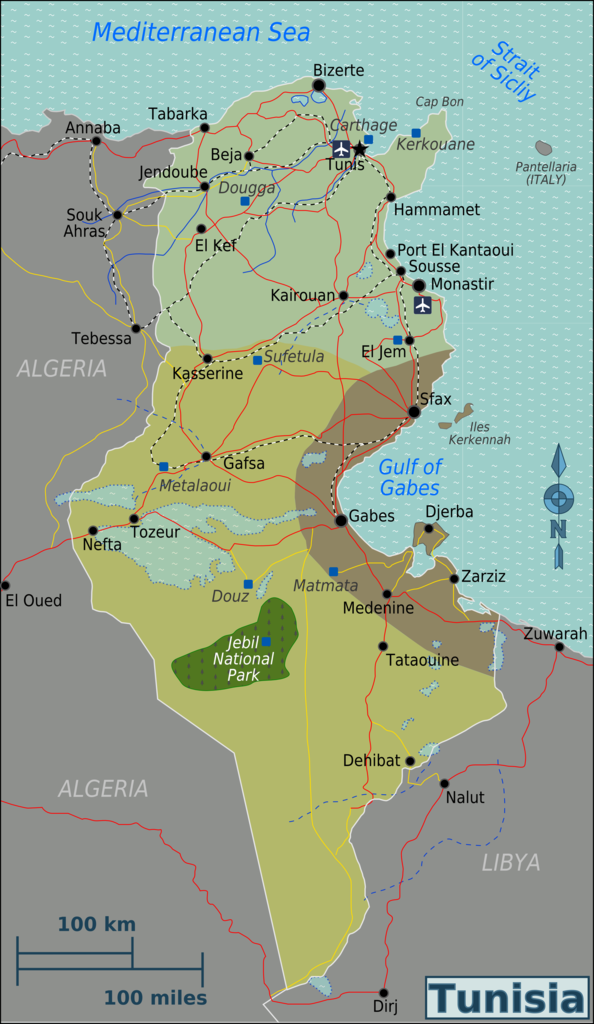
Specifically, I went to Bizerte and some of the nearby inland villages with a filmmaker colleague and his assistant so we could see the impact that the rural electrification programme had had on rural people. It was one of the areas where people had been given a choice, based on cost, between access to grid electricity (from wires strung across the countryside), which they'd have to wait for, or more immediate solar photovoltaic (PV) power from panels installed on their roofs. Remember, this was 2007 and only a few people had heard of Elon Musk and solar PV! This was groundbreaking stuff at the time.
The villages we saw in Bizerte were really tiny, typically a few dozen houses clustered around a mosque. Here's a sea view I managed to salvage, giving you a bit of a view of the coastline (I'm not sure what that town is), with the lovely electrical system in the foreground.
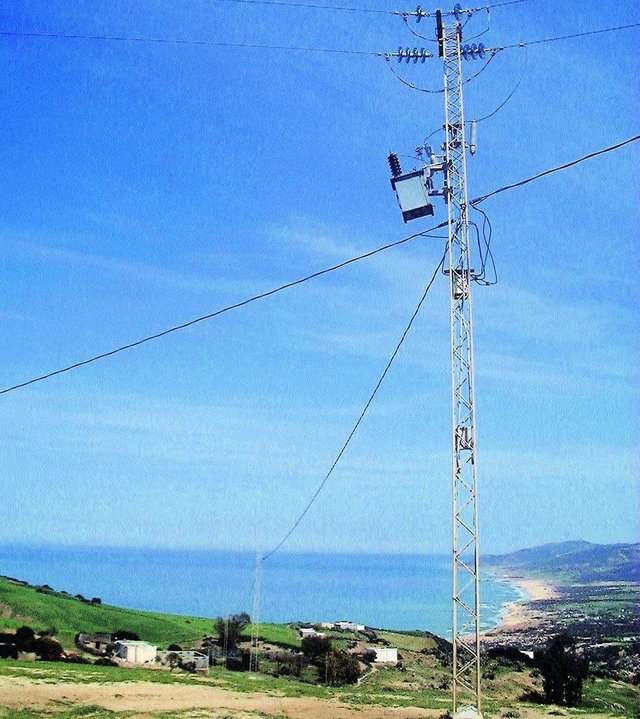
We also saw a lot of agricultural production.
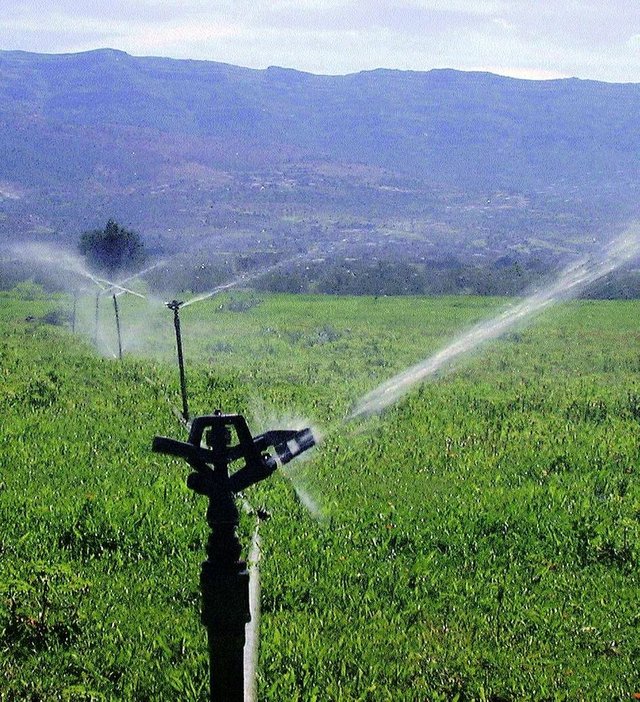
Introducing some of the people we met that day
So friendly! So welcoming! We interviewed schoolteachers, villagers, families and curious passers-by. They apparently spoke Bedouin languages first, Arabic second and perhaps French third. Our STEG guide, a charming gentleman, translated into French for me and I translated into English for the two South Africans filming.
These two gents were really curious about me and laughed their heads off at whatever our STEG guide must have told them about me. Glad to brighten someone's day!
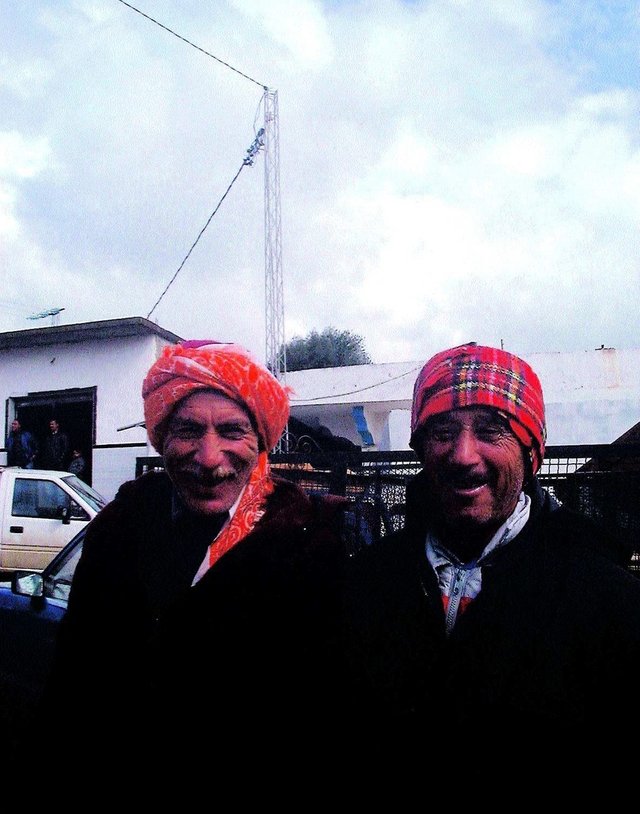
This woman was really happy that thanks to her electricity connection, she didn't have to suffocate breathing diesel fumes whenever she went to turn on the irrigation pump.
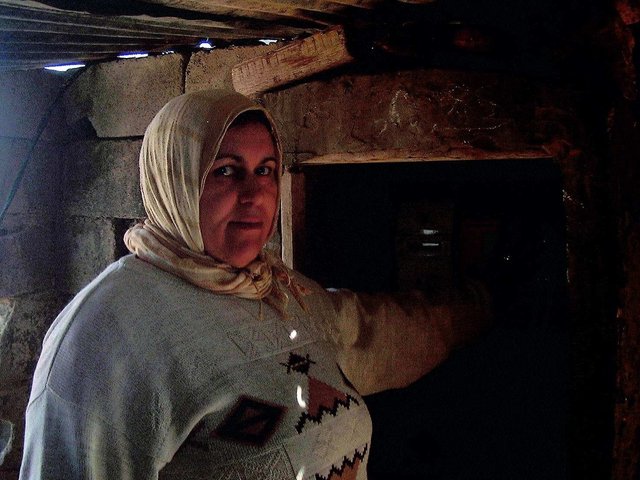
This woman was proud to show us that she could now plan meals for her family, as she could freeze meat and didn't have to travel into the village every day to get fresh food.
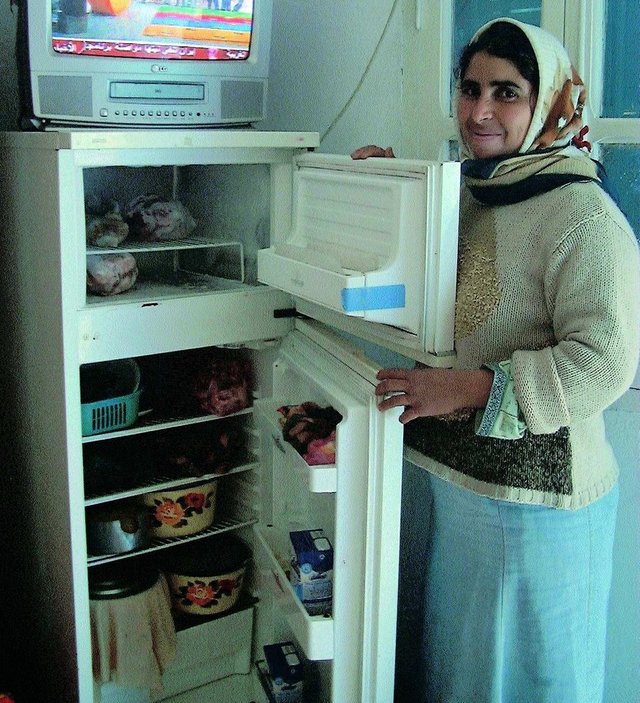
Oh my goodness, these girls were happy to have a tap. Apparently it had been installed within the last week or month (hard to tell sometimes with translation between three languages). Anyway, they figured their lives were better now they could have drinking water from a wall at their home instead of a well far from home.
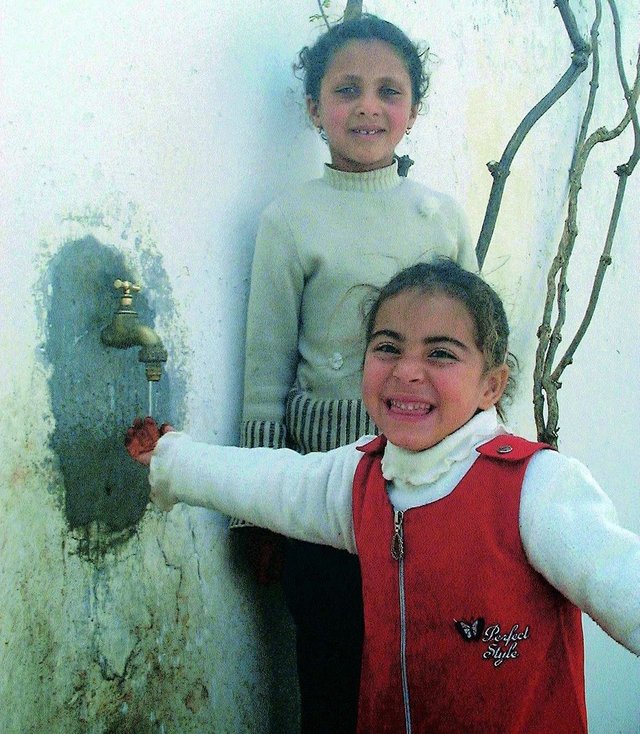
What amazed us about all the people we met was the beautiful colour and texture of their skin.
And of course, they fed us
The rural Tunisians we met were incredibly hospitable, insisting we sit with their families and have some traditional food with them. The meal we had consisted of a large unleavened pancake, surprisingly tasty, with a choice of honey or fresh olive oil to dip it in, fresh orange segments and piles of olives. Delicious!
Hoping to go back someday
As you can imagine, I'm keen to go back. I hope this little snippet gave you at least some idea of what rural Tunisia has to offer.
Wow what a stark difference from Tunis.
However, the rural area has what Tunis doesn't.
A beautiful natural landscape which isn't choked by buildings or urbanisation, just how I like it.
What is usually grown there in the rural area?
Great photographs!
Thanks for having a look, @arckrai. Wish I could tell you with certainty what they grow there, but since the climate is Mediterranean I'm going to go with "pretty much everything". They seem to have citrus, almond and olive groves, as well as growing all kinds of fruits (melons - yum) and vegetables, probably beans, squash, tomatoes and the like. It was really stunning countryside.
Wow, thank you for this wonderful trip you share. I will follow you because I am passionate about travel and you are very good at writing. Good job.
Thanks for the kind words, @izbing! I have to say I've really enjoyed travelling for work, since it's given me a chance to meet people I wouldn't otherwise meet. Appreciate your passion for travel! :-)
Tunisian people are so thankful for even small gifts or help. Nice post and pictures. Once i got tunisian homemade olive oil from my friend and it was the best olive oil i tasted.
Isn't it? I brought a huge tin back from Tunisia once (I wonder now how I did that? 😊). Anyway, as you say, best olive oil I've tasted too. And their black olives are SOOOO good.
Wow amazing. The disparity between urban environment I'm living in and rural Tunisia is huge. Seeing how other people are living reminds me that i should feel grateful for the stuff i have. This is so humbling!
Indeed, for me too, @dali.soh, especially considering how hospitable these people were. Their houses were humble but so inviting - we felt so welcome even though we couldn't speak each other's languages. And the food was truly awesome. None of this "awesome under the circumstances" stuff, truly awesome! What an experience!
@kiligirl,
It's the first time I really understand about Tunisia. Thank you very much for this perfect article! Really appreciate the effort!
Cheers~
Thanks, @theguruasia, and that was only one part of Tunisia. I can hardly wait to get to the south, where they basically live as far underground as they can to get away from the Sahara heat! Appreciate the support 🙂
Wow please don't stop writing this! Really amazing travelling experience is here. I never went there and hope I can't make in this life also. So, awaiting to read your experiences. Great work you have done!
Cheers~
Thanks so much, @theguruasia! 😊😊
Yes it's great how rural areas have often adopted PV way ahead of everyone else... just because it works so well for them! You see the same thing in rural India, Nepal, etc.
Indeed, now that PV is essentially cheaper than most grid options, especially for people who don't necessarily need or want 3-phase power (more expensive!). It's taking over rural energy supply worldwide 🙂
How little it takes to make other people fell happy :)))
That's amazing!!!
You said it! Isn't that true. Certainly reminded me of how much we have 😊😊
Yes, and we take everything for granted!
Too true...one of the reasons I moved from Canada to South Africa - so I'd have less wiggle room to take things for granted....
Which part of Canada?
I live in Canada and I tell you I love to get away, go to the woods up north and recharge :)
I grew up mostly on the South Shore of Montreal, in a town called Boucherville, and in those years we were lucky it was on the edge of urban development - so we could play in the woods and fish (well, catch small critters) all day if we wanted. I moved to downtown Montreal, to the area called the McGill Ghetto, in 1981 or so and still had a woods to enjoy with Mount Royal being right next to us.
I really get what you say about recharging! I never got enough of going into the woods to refill the spirit bucket 😊. South Africa is quite different and doesn't have that many areas, particularly close to Johannesburg where we live, where it's easy to go for a quick walk in the woods.
I've never been there.... but I can totally relate to your childhood. I grew up on the country side of Poland before moving to Canada....lots of good memories, probably that's why I like the nature so much...
P.S.
Would in be rude to ask you to support me on my blog..?
😊
Looks like great development took place in a short period of time!
Vision from leadership, and coordination between all levels of government. Wow, that's complicated, and really hard to get right. Except it's not if you want it to happen. We know all about that in RSA, don't we?
Very interesting - thank you for this post - resteeming
Thanks, @anneke! Glad you found it interesting.
interesting post
😊